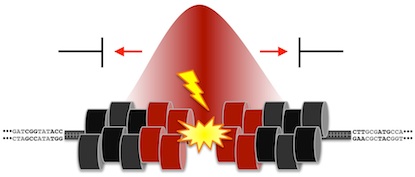Navigation auf uzh.ch
Navigation auf uzh.ch
The integrity of the genetic material in our cells is in constant danger: not only can reactive cell metabolites and various exogenous genotoxic agents cause damage to the genome, also the physiological DNA transactions associated with DNA replication or transcription can pose a serious threat for genome integrity if they are not well coordinated or insufficiently controlled. Sophisticated molecular mechanisms have thus evolved to prevent the excessive accumulation of DNA damage and thereby guard cells against genome instability. These mechanisms are often undermined in human cancers, allowing cancer cells to accumulate mutations at significantly increased rates. While such defects in genome maintenance mechanisms can contribute to and even drive cancer development, they can also provide a therapeutic opportunity if we can identify and understand the cancer-specific vulnerabilities they entail. Our research interest is to understand how human cells deal with genotoxic stress assaults and how they coordinate genome maintenance mechanisms with other vital nuclear functions. To this end we combine state-of-the-art molecular biology and biochemistry with powerful advanced cell imaging technologies, in particular employing single cell chromatin perturbations, high resolution live cell imaging, automated quantitative microscopy and software-assisted image analysis.

By targeted ablation of specific gene functions and high content analyses of DNA damage and repair markers we aim at identifying concealed regulators of the cellular response network to genotoxic stress and at understanding their role for genome maintenance. We recently revealed that self-amplificatory DNA and chromatin transactions must be tightly controlled and actively restrained to remain locally and temporally confined, and one major research focus of the lab lies on the physicochemical principles and macromolecular mechanisms that prevent excessive and potentially detrimental chromatin modifications in response to DNA breakage.

If you are interested in conducting molecular cancer research in a dynamic and vibrant international research environment, please consider the following opportunities:
Postdoctoral candidates
Motivated applications from postdoctoral candidates with a strong interest in chromatin biology and willing to apply for competitive fellowships are always encouraged. Please send your CV, list of publications, and research interests to
matthias.altmeyer@uzh.ch
PhD candidates
PhD students will be recruited through the Molecular Life Sciences (MLS) and Cancer Biology Programs of the Life Science Zurich Graduate School (LSZGS). Applications can be submitted twice a year, please see the LSZGS website for application deadlines and further details:
Master & Bachelor students
We regularly have research possibilities for UZH and ETH students to join our group. Please contact us directly.